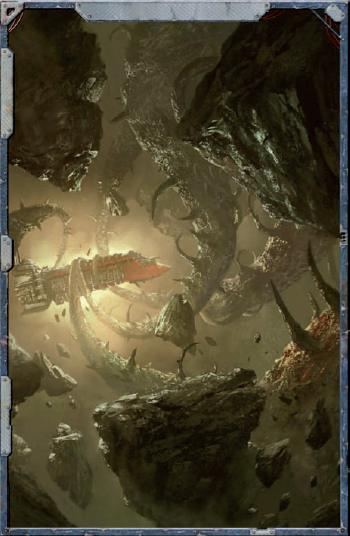Warhammer 40K Fan Group
Fans & Clans
For everyone that likes Warhammer 40k Tabletop and Dawn of War Games or anything to do with Warhammer 40K.
The physiology and nature of the Void Kraken are largely unknown, even to the most well-travelled Explorers of the Koronus Expanse. This is doubtless the result of their rarity and difficulty to hunt and detect, but could also be that they represent more than a single species of void behemoth, several variations on the beast mistakenly considered a single race of creatures. Whatever the truth of the Void Kraken’s origins, a number of facts are largely agreed upon by those who have come into contact with them. They are almost certainly some form of silicon-based creature, without blood, true bone, or fluid to keep them alive. Instead, it is believed by those few adepts to consider the beasts that the Void Kraken draw their animus from the very space debris they often resemble.
Once a Kraken has entangled a ship, it only disengages when the ship has been consumed or (if the ship is much larger than the Kraken) once it has taken a substantial bite from its hull. This process of consumption is as ponderous as the Kraken itself, however, and it is possible for a particularly brave crew to venture out onto the hide of the beast while it is feeding and lay mines on it or try and cut away its tentacles. Such a task is fraught with danger and the Kraken often reacts quickly to such “parasites” on its hide by throwing up small fanged tentacles to rake back and forth, scouring its stony flesh clean. Sometimes a Kraken declines to consume a ship straight away, or, if it has fed enough on its hull, it may leave the wreck alone. In these cases, Kraken have been known to drag lifeless ships from one system to another, gathering the hulks around remote worlds or in deep space, possibly to feed on at a later time






damn nature! you scary
"Nature doesn't just adapt. Nature cheats, changes the rules, and slips out the back door with your wallet while you're still trying to figure out what happened"
So wait.... doesn't that make Tzeentch the Chaos God of Nature by that logic? Because I thought Nurgle occupied that spot.
Tzeentch is change, Nurgle is disease, rot, and decay. More appropriate would be the Tyranid hive mind, seeing as how that quote was referring to the Zerg.
Starcraft.wikia.com
Starcraft.wikia.com
Using a Starcraft (1998) quote to describe Warhammer 40,000 (1987) is heresy and grounds for immediate purging.